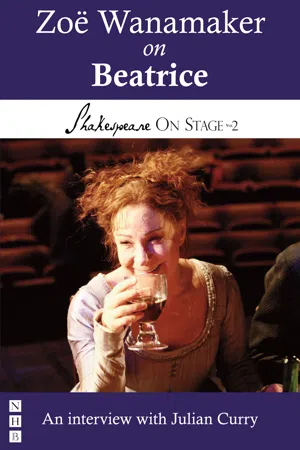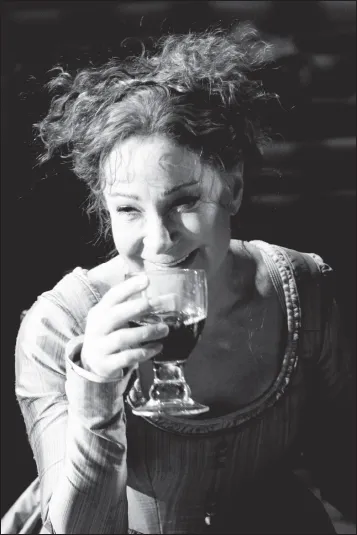![]()
Zoë Wanamaker
on
Beatrice
Much Ado About Nothing (1598–9)
National Theatre
Opened at the Olivier Theatre, London on 18 December 2007
Directed by Nicholas Hytner
Designed by Vicki Mortimer (set) and Dinah Collin (costume)
With Simon Russell Beale as Benedick, Oliver Ford Davies as Leonato, Susannah Fielding as Hero, Daniel Hawksford as Claudio, and Julian Wadham as Don Pedro
Shakespeare wrote Much Ado About Nothing between 1598 and 1599, as he was approaching the midpoint of his career. Chronologically, it nestles between the history plays Henry IV and Henry V. It is one of his best and most popular comedies, embracing elements of a romcom with meditations on love, honour and shame, and a shockingly sudden lurch into melodrama.
There’s a pun in the title: in Shakespeare’s day ‘nothing’ was pronounced noting, i.e. overhearing, or eavesdropping. Thus, on the one hand, Benedick and Beatrice are tricked into confessing their love for each other; and on the other, Claudio is fooled into rejecting his beloved Hero at the altar. Balthasar has some fun with the word before his song: ‘Note this before my notes: / There’s not a note of mine that’s worth the noting’ [2.3]. And, less relevantly perhaps, the word was also Elizabethan slang for a vagina.
Much Ado is rich with thematic echoes of other plays. The apparently motiveless villain Don John can be seen as a precursor to Iago. The falsely accused Hero is declared to be dead, but comes ‘miraculously’ back to life once her man has repented. Hermione follows the same path, with astonishing theatricality, in The Winter’s Tale. And Beatrice and Benedick, the feisty antagonists whose journey through the play ends in love and marriage, have much in common with Kate and Petruchio in The Taming of the Shrew.
The Hero/Claudio plot is believed to have been inspired by sixteenth-century Italian literary sources. However, Benedick and Beatrice, and the malapropping buffoon Dogberry, are Shakespeare’s inventions. Beatrice is one of his most captivating creations. During the opening scenes she parades a sharp, cynical wit, much of it at the expense of Benedick. As the play unfolds it gives way to amusing vulnerability. The shock of falling in love makes her unwell: ‘I am exceeding ill… I am stuffed, cousin, I cannot smell’ [3.4]. The character touches new depths with her passionate support for the wronged Hero in the church scene. No sooner has she declared her love to Benedick than she challenges him to kill his friend Claudio – and threatens to desert him if he refuses [4.1].
In 1968 I was cast as Friar Francis by the RSC. I played him young and ardent, received good notices, and felt pretty pleased with myself. But when the production toured to San Francisco I learned a valuable lesson. In California at the end of the 1960s it was rare to enter a bar where drinks were not served by topless girls, and the funky aroma of marijuana was everywhere. The Friar has a long wait before he comes on, and one evening I indulged in a small spliff. Just a wee one. The result was a revelation. My performance of the church scene felt superb, rich with interior monologue. My mind’s eye flashed back to Helen Mirren, who was playing Hero, as a five year-old laughing on her swing in the sunshine. She was being pushed by Sebastian Shaw (Leonato) and his adoration was palpable. It made his present reviling of her so much the more painful to witness. At the end as we walked off into the wings, I asked Alan Howard (Benedick) if he’d noticed anything different about my performance, expecting him to shower me with superlatives. But all he said was: ‘A bit slow.’
I interviewed Zoë Wanamaker at her home in Islington in December 2013. By then her initial concern about being past the age to play Beatrice had been allayed by the huge success of the production, and also by the recent casting of Vanessa Redgrave in the part, aged seventy-six, opposite the eighty-two-year-old James Earl Jones. You’re never too old…
Julian Curry: You and Simon Russell Beale were quite a lot older than Beatrice and Benedick are normally cast. One critic wrote, rather uncharitably, that you were into the Horlicks and Radox time of life. But another said that the age of the actors actually added pleasure and point to the piece. Did you find that?
Zoë Wanamaker: I think Nick Hytner’s casting was brilliant. Somebody once said to me: ‘Oh, you’ll never play Cleopatra.’ And it affected my whole career psyche, thinking I wouldn’t ever be cast as that kind of woman. So to be asked to play Beatrice was wonderful. At first I was worried, thinking the part needed somebody younger, but Nick persuaded me that we were the right age.
How so?
These two people are very bright, particularly Beatrice who has wonderful wit, and finds no match in the company she normally keeps. There is nobody who has her irony, her sense of humour or her self-deprecation. The household in which Beatrice lives is chauvinistic and part of a hierarchical society. Her cousin Hero is rich, young, innocent and ready to be married off, which was the normal thing. That’s the background to Beatrice’s domestic life.
You yourself got married relatively recently, didn’t you.
Yes, so I recognised something personal about Beatrice, because for years I never wanted to get married to anybody who wasn’t perfect. Of course there is no such thing as perfection, but from what I’d seen of some marriages I would rather be single, and I’d got to a stage in my mid-life when I was quite content to be by myself and just turn into a juicy old lady, and that would be that. Therefore I understood where Beatrice was coming from, and I think Simon maybe felt the same – never finding the right person, so it’s better simply to be on your own.
What period was the production?
It was kind of Elizabethan, but never specific. We had long frocks.
Set in Sicily?
Yes. The lighting was very warm. There was a flagstone floor, and we had...



